Posted by Rachel Bashford
Living with Parkinson’s: How to improve life quality.
Parkinson’s can affect daily life for many.
What practical support is out there to help.
Keep reading for up-to-date information on:
- What is Parkinson’s? Find out about the main issues affecting daily life.
- Practical support to help improve life for seniors with Parkinson’s.
- The future - what is evolving to assist those affected by Parkinson’s?
What Is Parkinson’s?
Parkinson’s disease is a long-term or chronic neurological condition. This means that Parkinson’s affects the brain as well as the nervous system. Dr James Parkinson named the condition in 1817 and prescribed it to be progressive in nature as symptoms generally worsen over time.
It has become clear that Parkinson’s impacts the brain through a loss of nerve cells. The area often affected is called the substantia nigra which controls the body’s voluntary movements.
The nerve cells in the substantia nigra are responsible for creating dopamine – a chemical which helps the brain send messages around the body through the nervous system. With the loss of these cells and a reduction in the production of dopamine, people with Parkinson’s may not have these movement signals transmitted effectively enough.
There are a variety of common symptoms that many people living with Parkinson’s may experience; although it’s important to note that not everyone will have these symptoms or to the same extent as others.
The most common symptoms are:
- Tremors
- Pain
- Trouble sleeping
- Stiffness or rigidity of your body
- Slower movement
- Some memory or thinking problems
- Possible mental health issues, such as anxiety or depression
This short video from Parkinson’s UK explains the condition in more detail.
How many UK seniors have Parkinson’s?
In a recent study, Parkinson’s UK stated that 1 in 37 British people will be diagnosed with Parkinson's at some point in their lifetime. The charity also estimates that there are approximately 145,000 people living with Parkinson's in the UK right now.
The table below reveals that those living with a Parkinson’s diagnosis are most likely to be over 65, with just over 133,000 seniors presently experiencing the condition.
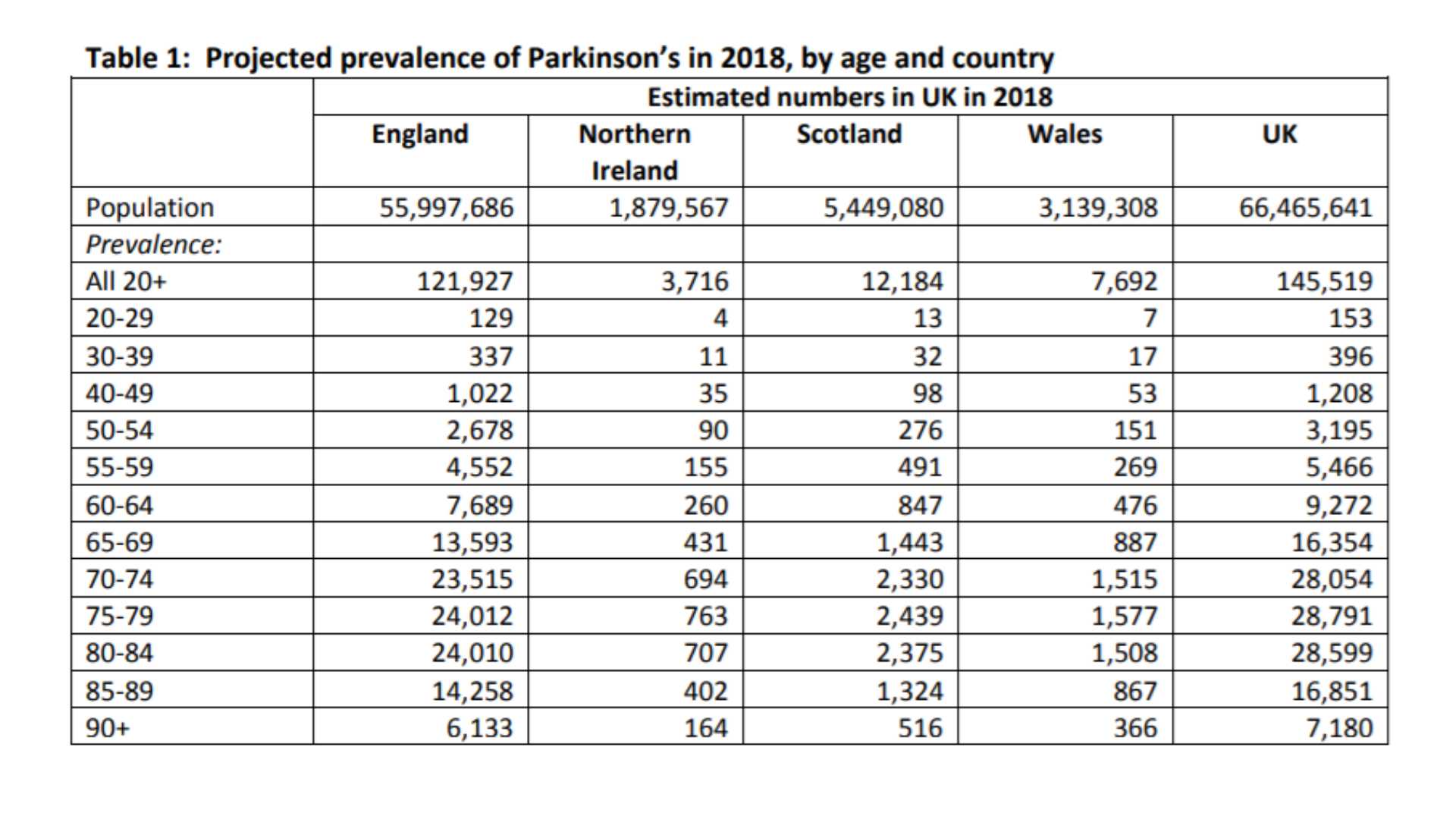
This short video describes what it’s like to live day-to-day with Parkinson’s, exploring all the challenges and obstacles it may scatter in the daily path of people with this diagnosis. Michael J. Fox, an American actor who has Parkinson’s himself, talks to other people affected to find out all about their experiences.
Source: Michael J Fox Foundation
What are the issues affecting people with Parkinson’s?
Alongside the symptoms of Parkinson’s, those living with a diagnosis may also have to deal with additional obstacles. These can be different for each person which often makes managing the condition quite tricky.
One particular issue that many face is that of balance. Parkinson’s can cause postural instability as balance becomes unstable due to a loss of reflexes. This can sometimes result in retropulsion, which is when someone falls backwards.
Another problem could be muscle seizure and the reduction in muscle efficacy. People with Parkinson’s may begin to drag to one side when they walk, experience a lack of co-ordination or have problems swallowing as muscles around the body are affected by the condition.
Medication plays a significant role in the management of Parkinson’s and it can be vital for people living with a diagnosis to have the right medication at the right time. This short video depicts Paula’s story as she discusses what it’s like to live with Parkinson’s and how medication is essential in helping her cope with pain.
Source: Parkinson's UK
Practical support for seniors with Parkinson’s
There is a wide variety of supportive equipment available for those living with Parkinson’s. Once a diagnosis has been established, specialists, occupational therapists or Parkinson’s nurses will undoubtedly talk through exactly what is needed for routine support.
It’s always good to check that the equipment you receive is the right solution for your particular situation. Your needs may change over time so having regular reviews as part of the process can also be helpful.
Movement support
Grab rails, frames, walking sticks and movement frames are some of the equipment available if you need some help with getting around.
Personal care
You may want to consider slip-resistant mats in the bath or shower room and a bath seat could be useful if you need to sit down while washing. Raised toilet seats and grab rails next to the toilet can be a lifesaver in terms of allowing you to care for yourself personally with a reduced danger of falling.
Bedtime
Lowering down into bed can be a real problem for many living with Parkinson’s. Having bed rails, raised beds or mattresses can offer practical help in this situation. Hoists and over-bed trapezes enable people to move up out of the lying position so they have more freedom getting in and out of bed.
Medication
Some people with Parkinson’s find keeping track of medications, timings and getting medication out of packs quite complicated. They may have to take lots of different medications at separate times of the day.
For this situation, there are plenty of pill organiser sets that help organise pills into times and days and some of these can automatically open at the correct time to take the dose. Dosette organisers and blister packs can come pre-filled for ease of use.
Pill organisers can come with medication alerts that show with sound, vibration or flashing lights when a dose needs to be taken. People living with Parkinson’s sometimes prefer to use dose alerts or timers on mobile phones or smart watches as it feels a little more personalised.
Communication
To help people living with Parkinson’s to navigate communication and technology, Parkinson’s UK have created a library resource tool which lists appropriate UK apps and technology that can aid in the support of people affected by Parkinson’s. In fact, some of these apps are specifically designed to support you or your loved one in terms of better sleep and improved wellbeing when living with a Parkinson’s diagnosis.
Alongside these, there are a wealth of apps and technological devices – from voice activation, medicine managers to personal alarms or monitors – that are available to suit you or your loved one’s individual needs.
How Will Future Tech Help People With Parkinson’s?
The good news is that there are plenty of research projects underway around the world that aim to improve the lives of those with a Parkinson’s diagnosis, help confirm the condition quicker or to create a cure.
One institution, Imperial College London, has multiple ongoing research trials. A significant project they are developing is research into trialling a surgical implant to prevent falls which have such a major impact for people with Parkinson’s.
Imperial College has stated that the focus is on a surgical implant that alters nerve activity with the aim of improving movement and reducing falls.
To clarify, the device sends a low-voltage electrical current to parts of the spinal cord and is already being used as a treatment for people with chronic back pain.
A leading researcher in the trial, Dr Yen Tai, said, “Frequent falls are a common and disabling problem in advanced Parkinson’s, and can lead to patient’s being housebound. They can also lead to serious complications like hip fractures requiring hospital admission.”
This research will enable the team “to trial a new treatment that could help improve outcomes for patients and how we deliver care,” Tai noted.
In addition, NIHR – the National Institute for Health Research – is trialling smart wearables for people with Parkinson’s. The trial involved patients using two smart wearable devices when they are walking on a daily basis.
The system, GaitThaw, is being developed to monitor movement and gait conditions, such as freezing, which can be a real issue for people with Parkinson’s. Reporting at an initial stage, NIHR has said that, “The device was shown to help patients overcome gait freezing and improve walking quality with a reduction of 55% in the occurrence of freeze events.”
In January 2021, the BBC reported that there has been additional funding given to research into a Parkinson’s disease sensor pen by Manus Neurodynamica, a company based in Edinburgh.
According to Manus Neurodynamica, the pen is designed to “help diagnose and monitor” neuromotor impairments by analysing body movements and is already being used in some NHS trusts.
How Can You Search For Specialised Parkinson’s Care?
If you or a loved one is in the position where they need or want specialist Parkinson’s care, then the Autumna website
can help. Performing a search for care home facilities that offer Parkinson’s care and support is easy to do.
First of all, visit the website and enter the area you want to search in the box, just like the image below.
Once you have your area search, you can then apply additional filters, from an extensive list to personalise your search further, such as for care homes specialising in Parkinson’s care, as in the image below.
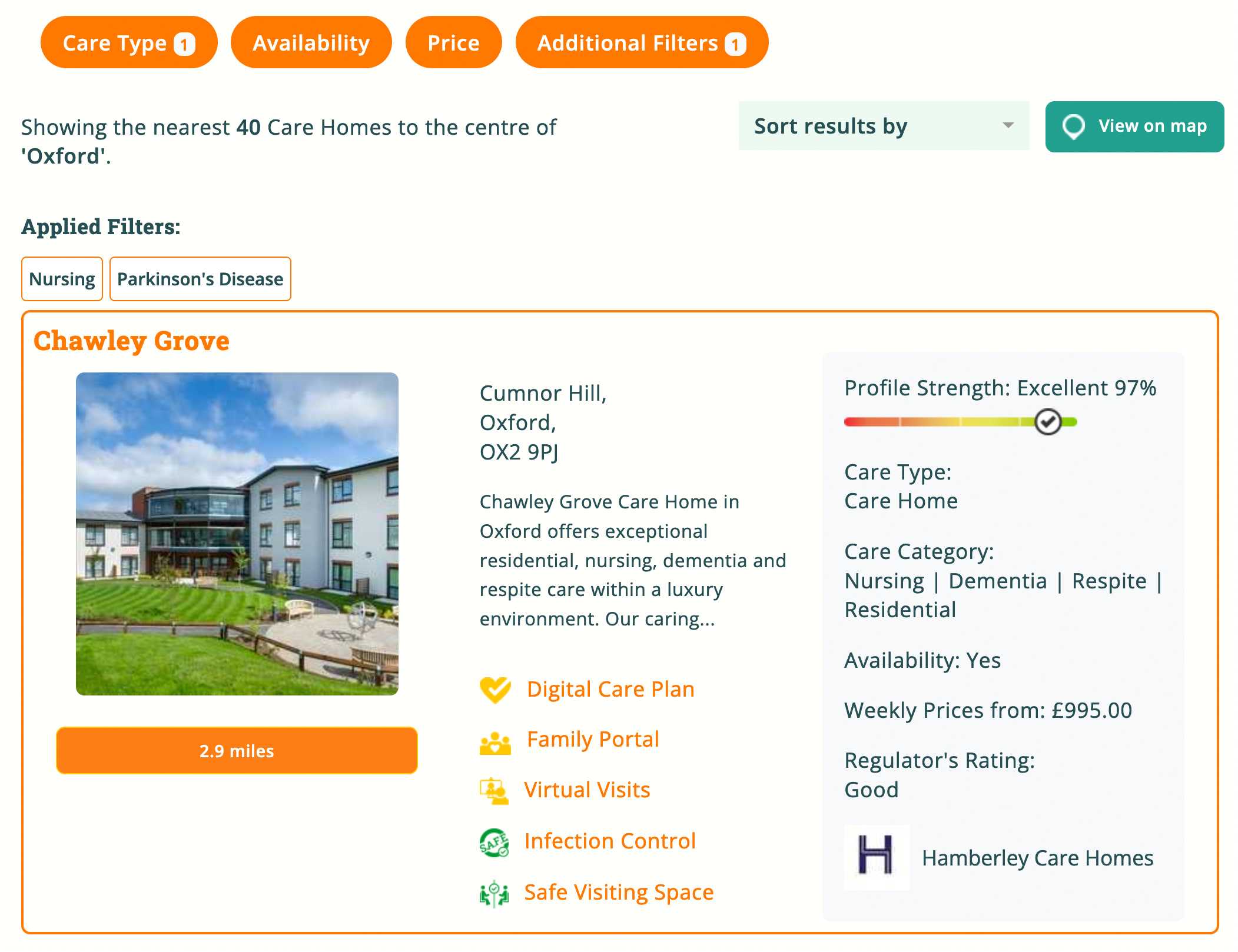
How can I find care providers that can help with Parkinson's?
Whether you're looking for home care, live-in care or a care home that can help with Parkinson's Autumna can help you. Simply complete this short form to let us know exactly what type of care is important to you, and we’ll send you a free shortlist of providers who can help.
Alternatively email us here: info@autumna.co.uk or call our Advice Line on 01892 335 330. Our phone line is open seven days a week. (8:30am - 5:30pm Mon-Fri, 10am - 5pm Sat, 10am - 4pm Sun).
Other articles to read
Autumna Blog
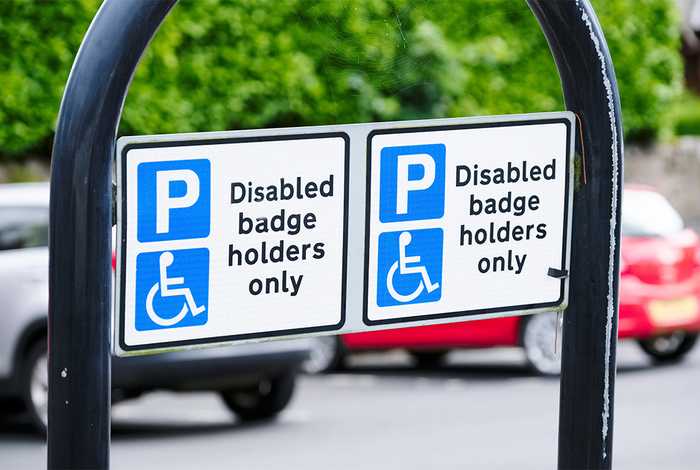
Older Persons Care Advice
Guide to applying for a blue badge as a carer
June 27th, 2025
Applying for a Blue Badge as a carer could ease daily struggles and restore independence. Discover who’s eligible, how to apply, and why it matters.
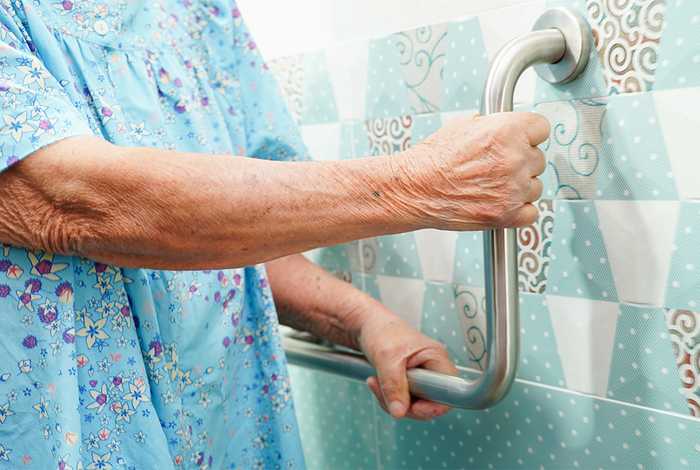
Older Persons Care Advice
Do you have to pay back a disabled facilities grant?
June 27th, 2025
Do you have to pay back a Disabled Facilities Grant? If you’ve ever asked this question and are unsure about how it works read our blog where to find out more.
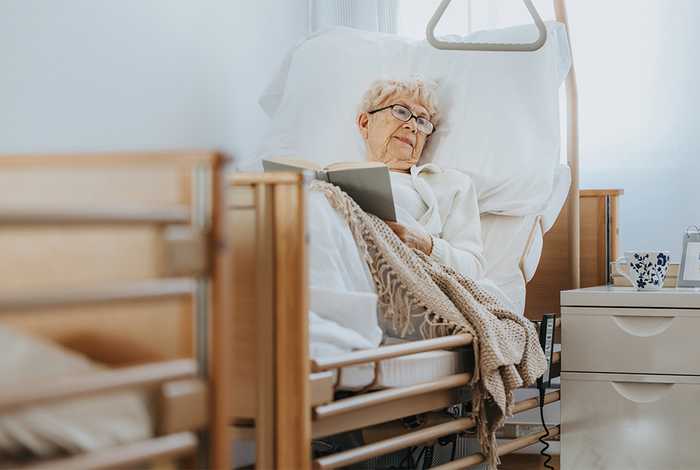
Older Persons Care Advice
How Discharge to Assess Pathways Reduce Hospital Stays
June 25th, 2025
Discover how the discharge to assess pathways can help to reduce hospital stays, speed up recovery, and support a smoother move into ongoing care.






